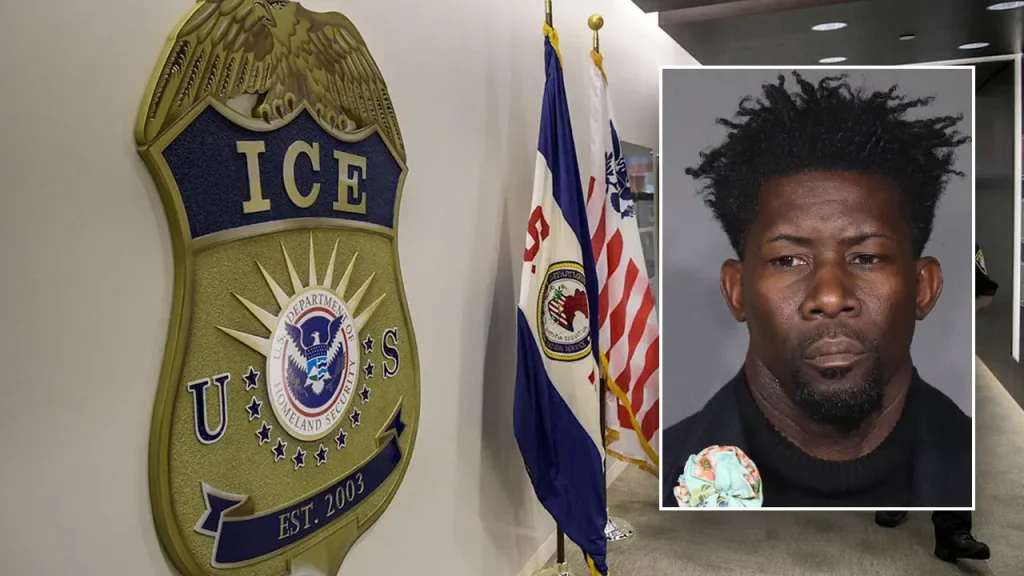Superintendent’s Secret Past Catches Up with Him: The Fall of Ian Andre Roberts
In a shocking turn of events that has rocked Iowa’s largest school district, Des Moines Public Schools Superintendent Ian Andre Roberts was arrested by U.S. Immigration and Customs Enforcement (ICE) agents following a dramatic chase that ended with him hiding in brush some 200 yards from his abandoned vehicle. The arrest has revealed a web of deception spanning decades, as Roberts—a respected educational leader—was discovered to be living in the United States illegally while facing outstanding weapons charges. The revelation has left the school community reeling and raised serious questions about the vetting process that placed him in charge of thousands of students.
Roberts’ journey to America began when he entered the country legally from Guyana on an F-1 student visa in August 1999 to attend St. John’s University in Queens, New York. However, according to ICE officials, his legal status to work in the United States expired in 2020 when his employment authorization card lapsed. Compounding his immigration troubles, Roberts was previously arrested by Port Authority Police in February 2020 on weapons possession charges that remain pending. Despite these legal issues, Roberts continued his ascent in American education, working in school systems across New York, Pennsylvania, Maryland, and St. Louis before landing the top job in Des Moines in July 2023. His appointment came after what the district described as “a comprehensive national search” that considered input from staff, parents, students, and community members—a process that clearly failed to uncover his immigration status or legal troubles.
The day of reckoning arrived when ICE agents attempted to apprehend Roberts on a fugitive warrant. Rather than surrendering, Roberts reportedly fled in a vehicle provided by the school district, eventually abandoning it and taking refuge in nearby brush where a K-9 unit ultimately located him. Inside the abandoned vehicle, authorities discovered $3,000 in cash, a fixed-blade hunting knife, and a loaded Glock 19 firearm—findings that cast an even darker shadow over a man entrusted with educational leadership. “This suspect was arrested in possession of a loaded weapon in a vehicle provided by Des Moines Public Schools after fleeing federal law enforcement,” said ICE Enforcement Removal Operations St. Paul Field Office Director Sam Olson, adding that Roberts’ hiring “without work authorization, a final order of removal, and a prior weapons charge is beyond comprehension and should alarm the parents of that school district.”
The legal timeline leading to Roberts’ arrest reveals a pattern of evasion. On May 22, 2024, a judge ordered his deportation in a hearing held in absentia—meaning Roberts wasn’t present for proceedings that determined his fate. Nearly a year later, on April 24, 2025, an immigration judge in Dallas denied Roberts’ motion to reopen the case, effectively sealing his removal from the country. Throughout this period, Roberts maintained his public persona as an accomplished educator with an inspiring backstory. The Des Moines Public Schools had proudly announced upon his hiring that “Dr. Roberts proudly shares that he was born to immigrant parents from Guyana, and spent most of his formative years in Brooklyn, NY”—a narrative that, while technically accurate, omitted the crucial detail of his illegal status. Beyond his educational credentials, Roberts had gained additional prestige from his athletic accomplishments, having represented Guyana as a middle-distance runner in the 2000 Sydney Olympic Games.
The aftermath of Roberts’ arrest has left the Des Moines school community scrambling to make sense of the situation while maintaining stability. School Board Chair Jackie Norris quickly announced that Associate Superintendent Matt Smith would serve as interim superintendent, acknowledging in a message to the community that they had “no confirmed information as to why Dr. Roberts is being detained or the next potential steps.” The revelation has sparked particular concern given Roberts’ position of authority over thousands of children and families. Parents and community members are left wondering how thoroughly the district vetted its top administrator before placing him in a position that requires not only educational expertise but also moral authority and legal standing. The case highlights the potential gaps in hiring processes even for the most sensitive leadership positions in public education.
Despite the serious nature of the allegations against him, Roberts has found some support from community organizations with which he worked closely. The Directors Council, a local group of nonprofits focused on Des Moines’ Black community where Roberts served as a board member, issued a statement calling him “a trusted partner, a dedicated advocate for equity, and an unwavering supporter of families and youth in Polk County.” The group described his contributions as “immeasurable” and pledged to stand with him “during this uncertain moment.” This support underscores the complex legacy Roberts leaves behind—a man who by many accounts performed admirably in his professional role while harboring significant secrets about his legal status and past. As the case unfolds, the Des Moines community faces difficult questions about trust, vetting, and the true qualifications for educational leadership beyond academic credentials and professional experience. For now, the district must focus on stability while processing the betrayal of trust from someone they had entrusted with their children’s education.









